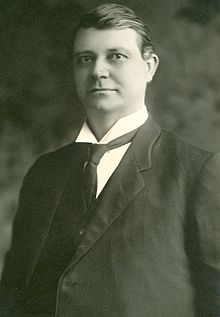Claude Kitchin
| Claude Kitchin | |
|---|---|
 |
|
| House Majority Leader | |
|
In office 1915–1919 |
|
| Preceded by | Oscar W. Underwood |
| Succeeded by | Frank W. Mondell |
| House Minority Leader | |
|
In office 1921–1923 |
|
| Preceded by | Champ Clark |
| Succeeded by | Finis Garrett |
| Member of the U.S. House of Representatives from North Carolina's 2nd district | |
|
In office March 4, 1901 – May 21, 1923 |
|
| Preceded by | George H. White |
| Succeeded by | John H. Kerr |
| Personal details | |
| Born |
March 24, 1869 Scotland Neck, North Carolina |
| Died | May 21, 1923 (aged 54) Wilson, North Carolina |
| Political party | Democratic |
| Alma mater | Wake Forest College |
Claude Kitchin (March 24, 1869 – May 21, 1923) was a U.S. Congressional Representative from North Carolina and floor leader of his party in the House during the 64th, 65th, and 67th Congresses.
He was born in Halifax County, North Carolina in 1869. His father was William H. Kitchin and William Walton Kitchin was his brother. First elected in 1900, after his party secured a constitutional amendment excluding blacks from the ballot boxes of the state, a campaign in which he served as a leading orator, he served in Congress as a member of the Democratic Party until his death. In Congress, he served on the House Ways and Means Committee, chairing the Committee from 1915 to 1919. From 1915 to 1919 he was House majority leader; from this position he opposed the Wilson administration's "Preparedness" crusade, seeking unsuccessfully to hold down the growth in size of the army and navy.
He was one of the representatives who voted against declaring war on Germany in April 1917; indeed, his example and speech against American entry probably swelled the number of dissenters to 50. He threw himself into the war effort thereafter but remained a critic of some of the administration's war policies, especially regarding taxation policies. He championed an "excess profits" tax that was steeply progressive over a policy of selling Liberty Bonds that shifted the financial burden of the war onto future generations. After giving an impassioned speech in 1920 he suffered a severe stroke, from which he never recovered.
...
Wikipedia
